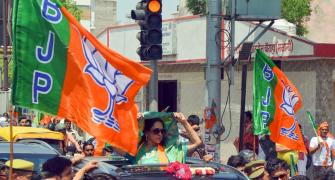Audit and consulting firm KPMG has said adoption of stringent global procedures on anti-money laundering could pose a competitive disadvantage for foreign banks.
KPMG, however, said it is advisable that local bank operations of a foreign bank meet the stringent global standards. If procedures are set at a local level there is a risk of inconsistency making the bank vulnerable to money launderers, KPMG said in its Anti-Money Laundering Survey 2005 - India.
It said any waiver on compliance with the higher global standards should be only with sanctions from the global head office.
Anti-money laundering guidelines have evolved to be more stringent in countries such as the US, while in India they are in infancy.
But the US-based Citibank was recently penalised by the Reserve Bank of India for not adhering to "know your customer" norms, which are part of the anti-money laundering efforts.
KPMG senior manager-Middle East & South Asia, Colin Lobo, said he cannot comment on individual entities, but asserted such events are taken note of by home country regulators and necessary actions are taken.
Lobo said recognition by financial institutions of the need to preserve their reputations makes investments in robust anti-money laundering systems vital, which will also help enhance investor and consumer confidence.
By definition money laundering is international in nature. In the past, AML legislations varied across countries, giving launderers the opportunity to take advantage of financial institutions in countries where the rules were not very stringent.
Taking cognisance of the situation, the Organisation of Economic Cooperation and Development-promoted Financial Activities Task Force is making it obligatory for countries to have equivalent legislation to deny launderers such opportunities.
Indian Banks' Association chief executive, H N Sinor, said IBA is attempting to become a member of FATF, for the benefit of the country's financial sector.
Sinor said transactions will need to be monitored after they are put through the core banking systems. "It's a tough call and the major worry is law enforcing agencies will haul up bankers for any suspicious transactions," he said.
India has passed the Prevention of Money Laundering Act, but it is yet to be notified and also a nodal agency is still to be identified for its implementation.
The KPMG survey covered 100 banks in India across public, private and cooperative sectors. It said as many as 71 per cent of the participants described AML environment in India as slowly moving in the right direction, while 19 per cent thought it is moving rapidly to enable the Indian AML environment to catch up with international best practice.







